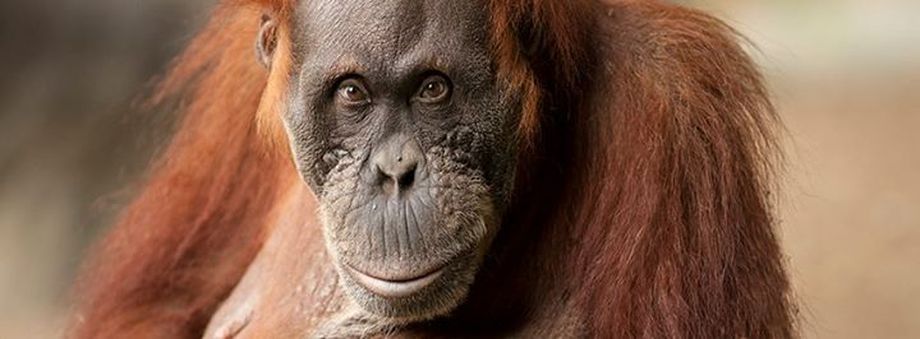
Education
You can find great information about orangutans at these sites:
According to the International Zoo Educators Association, “Conservation education is the process of influencing people’s attitudes, emotions, knowledge, and behaviors about wildlife and wild places. This is done through the efforts of skilled educators and interpreters, who use a variety of techniques, methods, and assessments to reconnect people with the natural world.” Conservation education about orangutans is one of the SSP’s most critical goals. Educational programs help build public awareness of the various issues facing captive and wild orangutan populations today.
The need for effective conservation education – especially with critically endangered species like the orangutan – is pressing. The desire to understand animals has been joined by the need to conserve their populations and ecosystems. Over the last few decades, zoos have rapidly expanded their conservation and research programs. Our visitors’ understanding of animals’ needs and of human impacts on animal populations has become critical, because the future of these animals depends on people.
Click here to download the Orangutan SSP’s Key Messages; these are the major points on which SSP-member zoos are encouraged to focus in their education programs, in order to promote consistent messaging.
The zoo community generally assumes that AZA zoos are responding to the orangutan crisis by stepping up their conservation messaging and education to change visitor behavior and attitudes. In the winter of 2008-09, zoos were asked to participate in an Orangutan SSP Education Survey to find out if this was true, and to look for opportunities to facilitate greater networking and resource sharing.
The people who responded to the survey demonstrated commitment and a desire to improve their educational efforts, presenting a wide range of creative ideas. There might be cause for worry, however, in the fact that less than half of the AZA zoos with orangutans responded to the survey, despite its availability on keeper, educational and volunteer listservs as well as direct emails to the attendees of the 2nd Orangutan SSP Husbandry Workshop. On the other hand, the 43% response rate might illustrate a need for a shared virtual space, with free access to all zoo professionals and volunteers concerned with orangutan care, conservation and education. Click here to download the survey results document.
You can find great information about orangutans at these sites:
- Orangutan Caring Week 2023 Toolkit - NEW!
- UNEP's Great Apes Survival Partnership (GRASP)
- UNEP's "Orangutans and the Economics of Sustainable Forest Management in Sumatra"
- World Wildlife Fund Orangutan page
- National Geographic Orangutan page
- National Geographic Kids Orangutan page
- PBS' Orangutans: Just Hangin’ On
- Orangutan SAFE - I HEART Orangutans Toolkit
- #RoamingRambutan
According to the International Zoo Educators Association, “Conservation education is the process of influencing people’s attitudes, emotions, knowledge, and behaviors about wildlife and wild places. This is done through the efforts of skilled educators and interpreters, who use a variety of techniques, methods, and assessments to reconnect people with the natural world.” Conservation education about orangutans is one of the SSP’s most critical goals. Educational programs help build public awareness of the various issues facing captive and wild orangutan populations today.
The need for effective conservation education – especially with critically endangered species like the orangutan – is pressing. The desire to understand animals has been joined by the need to conserve their populations and ecosystems. Over the last few decades, zoos have rapidly expanded their conservation and research programs. Our visitors’ understanding of animals’ needs and of human impacts on animal populations has become critical, because the future of these animals depends on people.
Click here to download the Orangutan SSP’s Key Messages; these are the major points on which SSP-member zoos are encouraged to focus in their education programs, in order to promote consistent messaging.
The zoo community generally assumes that AZA zoos are responding to the orangutan crisis by stepping up their conservation messaging and education to change visitor behavior and attitudes. In the winter of 2008-09, zoos were asked to participate in an Orangutan SSP Education Survey to find out if this was true, and to look for opportunities to facilitate greater networking and resource sharing.
The people who responded to the survey demonstrated commitment and a desire to improve their educational efforts, presenting a wide range of creative ideas. There might be cause for worry, however, in the fact that less than half of the AZA zoos with orangutans responded to the survey, despite its availability on keeper, educational and volunteer listservs as well as direct emails to the attendees of the 2nd Orangutan SSP Husbandry Workshop. On the other hand, the 43% response rate might illustrate a need for a shared virtual space, with free access to all zoo professionals and volunteers concerned with orangutan care, conservation and education. Click here to download the survey results document.

